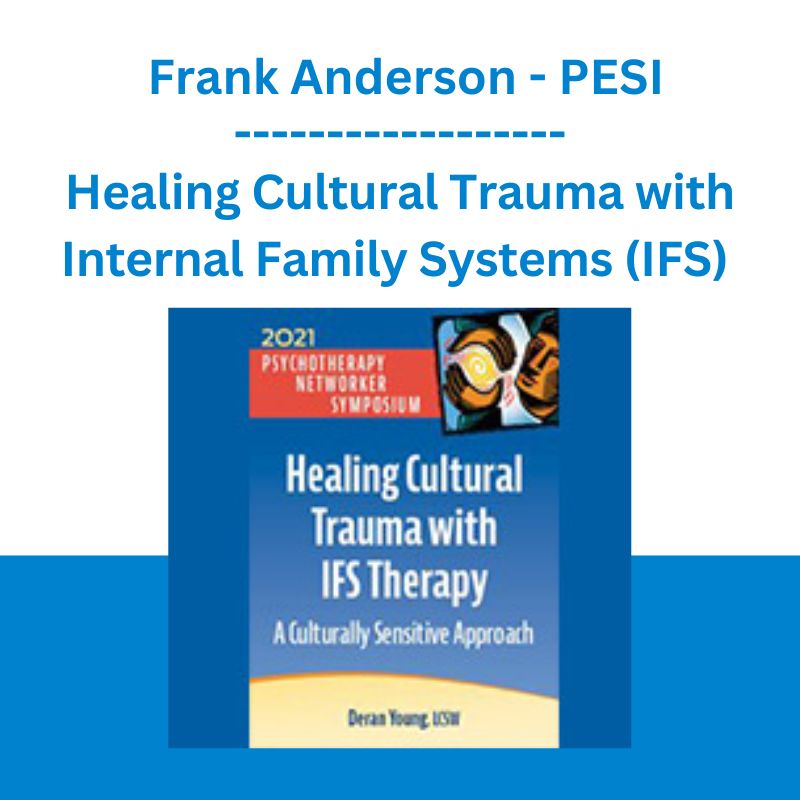*** Proof of Product ***
Exploring the Essential Features of “Healing Cultural Trauma with Internal Family Systems (IFS) – Frank Anderson – PESI”
Despite an increased willingness in our profession to discuss issues of diversity, including race, sexuality, gender, class, etc., we still have a long way to go in addressing the traumatic effects of systemic oppression. As therapists, we can acknowledge and try to remediate these negative effects by providing culturally sensitive care for people who often feel unseen or misunderstood. Using the framework of Internal Family Systems (IFS) therapy, this recording offers practical skills to help heal the traumatic wounds of oppression. You’ll discover how to:
- Use the Intercultural Development Continuum with clients to explore how cultural perspectives impact communication and conflict style
- Apply the IFS model to help heal trauma, and acknowledge and own the parts of ourselves that become reactive when discussing issues of diversity
- Increase your ability to avoid microaggressions and help clients explore emotional wounds with culturally sensitive techniques including, “The U-turn” and “Unblending”
Speaker
Deran Young, LCSW
Deran Young, LCSW, is the Founder of Black Therapists Rock, an organization that includes over 20,000 professionals committed to reducing intergenerational trauma in marginalized communities.
Speaker Disclosures:
Financial: Deran Young has employment relationships with Brene Brown Education and Research Group, Internal Family Systems Institute, and Black Therapists Rock, Inc. She receives a speaking honorarium and recording royalties from Psychotherapy Networker and PESI, Inc. She has no relevant financial relationships with ineligible organizations.
Non-financial: Deran Young has no relevant non-financial relationships.
Objectives
- Determine how to use the Intercultural Development Continuum with clients to explore how cultural perspectives impact communication and conflict style.
- Apply the IFS model to help clients heal trauma and address inner parts that become reactive when discussing issues of diversity.
- Apply two culturally sensitive techniques to help clients explore emotional wounds.
- Determine how to work from an anti-oppressive framework to enhance clinical outcomes by improving your therapeutic alliance with clients.
- Perform assessment and treatment for psychological distress induced by marginalization.
Outline
- Describe how to use the Intercultural Development Continuum with clients to explore how cultural perspectives impact communication and conflict style.
- Explore the six stages in the Developmental Model of Intercultural Sensitivity
- Examine the three types of cultural conflict styles
- Apply the IFS model to help clients heal trauma, and acknowledge and own the parts of ourselves that become reactive when discussing issues of diversity.
- Apply the basic principles of IFS to Cross Cultural Communication
- Utilize the IFS model to discover our own implicit bias
- Use the “8Cs” to understand the difference between operating from Self and Parts
- List two culturally sensitive techniques to help clients explore emotional wounds.
- Practice doing the U-Turn
- Explore why Unblending helps in intercultural communication
- Understand how unburdening will increase capacity for compassion and connection
- Utilize the U-Turn, Unblending and Unburdening to successfully conduct Relational Repairs as needed
- Explain what it means to work from an anti-oppressive framework to enhance clinical outcomes by improving your therapeutic alliance with clients/patients.
- Establish shared meanings of key terms, to include: culture, diversity, race, equity, bias, privilege and power
- Explain the theory of Kyriarchy
- Identify tools and practices that are culturally relevant to respond to the complex experience of oppression
- Explore the four primary Legacy Burdens in our society: Racism, Patriarchy, Materialism, and Individualism
- Provide assessment and treatment for psychological distress induced by marginalization.
- Explain ways that structural oppression impacts the inner psychic system
- Analyze challenges and barriers that perpetuate health disparities and re-victimization in the clinical setting
Target Audience
- Counselors
- Social Workers
- Psychologists
- Psychotherapists
- Therapists
- Marriage & Family Therapists
- Addiction Counselors
- Case Managers
- Physicians
- Nurses
- Other Mental Health Professionals
Please see the full list of alternative group-buy courses available here: https://lunacourse.com/shop/










 Crypto Dan - The Crypto Investing Blueprint To Financial Freedom By 2025
Crypto Dan - The Crypto Investing Blueprint To Financial Freedom By 2025  Fred Haug - Virtual Wholesaling Simplified
Fred Haug - Virtual Wholesaling Simplified  George Fontanills & Tom Gentile - Optionetics 6 DVD Series Home Study Course (Digital Download)
George Fontanills & Tom Gentile - Optionetics 6 DVD Series Home Study Course (Digital Download)  The Daily Traders – Exclusive Trading Mentorship Group
The Daily Traders – Exclusive Trading Mentorship Group  Jesse Livermore Trading System - Joe Marwood
Jesse Livermore Trading System - Joe Marwood